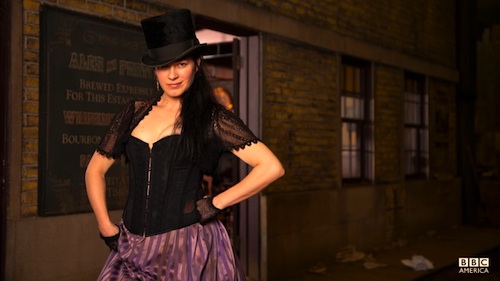By Joe Bendel. Aren’t cop shows popular in the Midwest anymore? Anyone with a passing familiarity with the Law & Order franchises should understand the principle of lawyering up. Yet, one teen-aged fast food employee allows her manager to humiliate her on the instructions of a caller falsely identifying himself as a police officer in Craig Zobel’s ripped-from-the-headlines-with-the-names-changed-to-protect-the-innocent indie drama Compliance, which is now playing in New York.
Sandra, the restaurant manager, is under a lot of stress. She does not have enough bacon or pickles to make it through the weekend. Becky is an okay, but not a great employee. When “Officer Daniels” calls Sandra, sight unseen, claiming a customer accused the teenaged cashier of stealing money from her purse at the check-out counter, she is surprised but not incredulous. Just why the accuser never said anything at the time is an obvious question never asked. Dutifully, Sandra agrees to help Daniels’ investigation by sequestering Becky in the backroom, rifling through her belongings, and before long even strip-searching the confused young girl.
Of course, Sandra cannot find the “missing” money, which allows “Officer Daniels” to continue escalating the situation. Periodically, other restaurant employees are brought into this sensitive situation, who either reluctantly comply (so to speak) or wash their hands of the mess. To Zobel’s credit, he never plays any gender warfare cards. In fact, the voices of reason at this Chick-Wich are all male. However, the biggest offender also happens to be Van, Sandra’s inebriated fiancé, enlisted to “guard” Becky.
 Yes, this is loosely based by a real case that even inspired an episode of Law & Order: SVU. While we cannot intellectually dismiss the events depicted in the film out of hand, it is important to remember they took place over the course of hours. This is a boiling frog phenomenon that simply is not credible in a mere ninety minutes. Granted, old Van was drunk as a skunk, but going from “hello Officer Daniels” to absolutely indefensible acts in about sixty seconds flat is dramatically problematic on-screen, regardless of the actual case files.
Yes, this is loosely based by a real case that even inspired an episode of Law & Order: SVU. While we cannot intellectually dismiss the events depicted in the film out of hand, it is important to remember they took place over the course of hours. This is a boiling frog phenomenon that simply is not credible in a mere ninety minutes. Granted, old Van was drunk as a skunk, but going from “hello Officer Daniels” to absolutely indefensible acts in about sixty seconds flat is dramatically problematic on-screen, regardless of the actual case files.
Pat Healy is effectively creepy and authoritative as “Daniels,” while Ann Dowd convincingly puts a harried every-person face on Sandra. Dreama Walker (known as a recurring on Gossip Girl) also has some very well turned scenes that help explain the victim’s mindset. Frankly, their performances are good enough to sell the initial set-up. It just spins out too quickly into some rather lurid places. Witnessing it all is supposed to challenge viewers to wonder what they would have done had they been in Sandra or Becky’s shoes. However, many will probably just quietly repeat to themselves the mantra: “right to an attorney.” After all, third graders can recite the Miranda warning by heart these days.
Perhaps the most troubling aspect of Compliance is its borderline vicarious sadism, essentially condemning its cake and eating it too. Ironically, though, the acts it portrays will make it easier for viewers to erect walls around the film and flatly deny they could ever be induced to act in such a manner. Hopefully they are correct. At times provocative, but also rather messy and ham-fisted, Compliance is a notable failure, probably worth viewing at a later stage for those who want to know what all the furor was about when it so sharply divided audiences at this year’s Sundance. For now, it is showing in New York at the Landmark Sunshine.
LFM GRADE: C+
Posted on August 18th, 2012 at 2:43pm.




